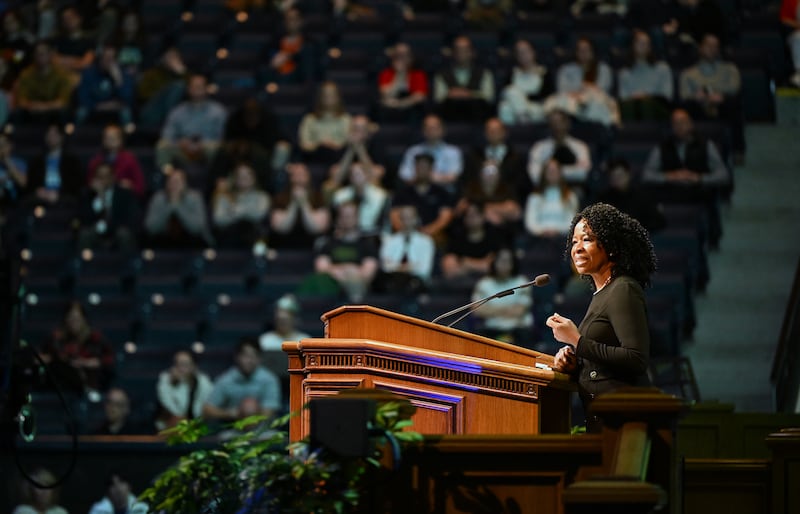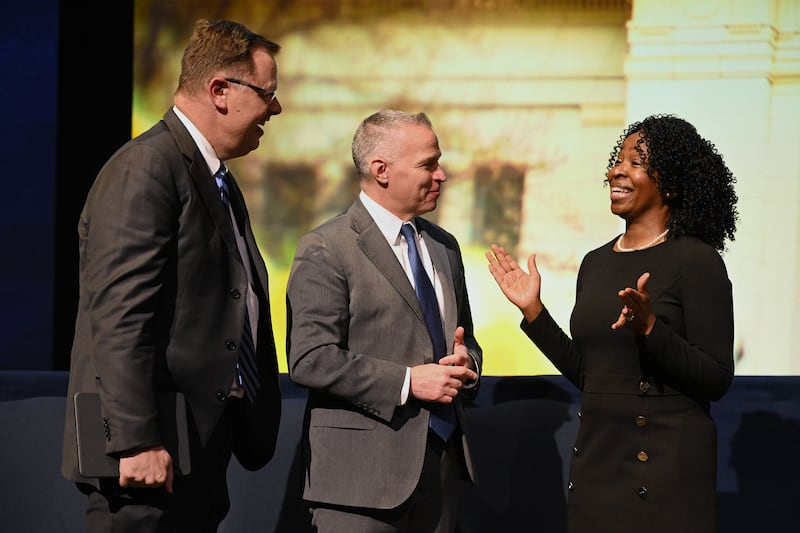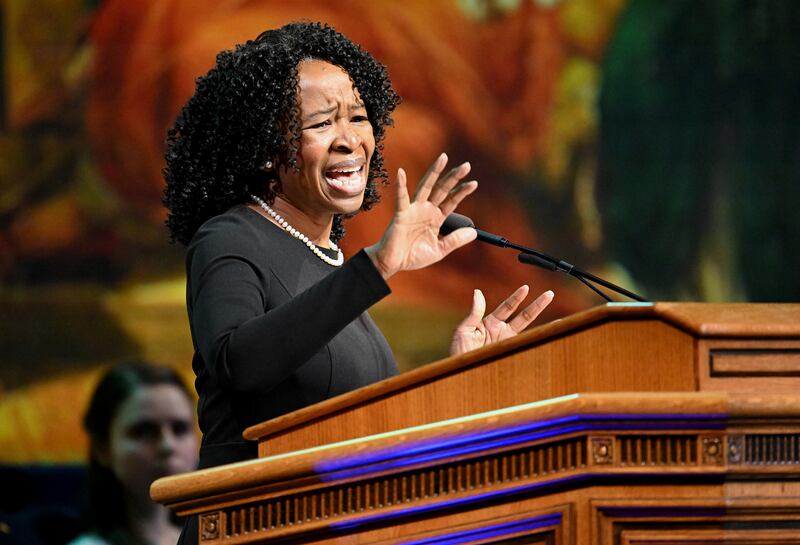Religion is for the public sphere, not the private sphere, Harvard law professor Ruth Okediji told an audience of thousands of Brigham Young University students. Her remarks entitled “The Costly Arc of Religious Freedom” were the center of BYU’s forum Tuesday.
“I am fully an academic and I am fully a person of faith,” Okediji said. “I am never less of one or the other.”
Okediji, an internationally recognized authority on intellectual property law and co-director of the Berkman Klein Center, spoke from experiences she gathered during her storied career closely collaborating with United Nations agencies and her path of Christian discipleship. She addressed what she called a “paradox” at the heart of narrow conceptions of religious freedom: it can prevent people from fully integrating faith into every aspect of their lives.
This, she said, is intended to limit people of faith’s engagement in the public sphere and is detrimental to pluralism.
As some have conceived it, she noted, “religious freedom focuses only on the individual, not on the collective, not on the community.” The more that a Christian cares about preserving their private religious rights alone, she argued, the less disposed they may be to integrate their faith into all aspects of their public life. And for Okediji, faith is ever present in her life. “Let me be clear that the reason why I’m so rigorous as a scholar is not because I’m an academic, it’s because I’m a Christian.”
Okediji said she has a habit of praying in her classroom before her students arrive. “Yes, at Harvard,” she quipped to audience applause.
On one such occasion, she prayed for 45 minutes and ended up before a picture of the family who brought the first lawsuit challenging the right of Christians to pray in public schools. For Okediji, seeing this picture evoked the idea that “we are designed to be fully integrated people.”
“Whether we’re having fun, whether we’re at school learning, whether we are worshipping in church, whether our worship is internal or external, we are fully integrated across all,” she said.

This means that intellectual work is directly connected to faith. “I invite you to think about this, the most magical defense of the gospel of Jesus Christ was not done through supernatural science,” Okediji stated, “... instead, it is a classic method: the dialectic.”
Persuasion and the dialectic is “essential to productive spiritual growth,” Okediji explained, pointing toward how people in the scriptures were persuaded that Jesus was the Messiah after careful conversation.
“It was embodied in the physicality of Jesus: the son of God, the son of man. He was a carpenter, he was a teacher. He was a servant, he was a leader. He was a prophet with a message that the world desperately needed then and desperately needs now. It was a world that had to be persuaded and still does,” Okediji said.
What Jesus did that’s written in scripture shows that spiritual life is not isolated to only some parts of our lives, Okediji said. A limited understanding of religious freedom can fall short when it seeks to impede the full integration of a spiritual life in the public sphere.
Due to the demands of Christianity, a disciple’s life functions best when the person makes no distinction between private and public behavior. “Can you love God privately?” Okediji asked. “Is that possible as an integrated person?”
When the state seeks to silo religion into exclusively the private sphere, then a Christian cannot actually love God in the way the faith demands, she argued. “Once couched as religion, the state’s power gets deployed to marginalize and to limit the spaces and the places and the ways in which Christians express their faith.”
“You see, the most important thing we can do is love God. And if we must love him with everything, then it goes without saying that we will be driven to lives that are increasingly full of God,” Okediji said. “Whether it’s at school, whether it’s at work or at church, there will be no private sphere or public sphere that you’re defining.”

There’s no way to love God privately, she said. “In fact, loving God privately is uniquely un-Christian, I would argue. But that’s exactly what religious freedom suggests — this so-called private zone where we’re supposed to practice our faith.”
Separating religious freedom into public and private spheres prevents the integration of certain virtues into public life. This distinction cannot be accepted when “the evidence tells us that faith actually improves people’s lives.”
Speaking to a Marriott Center audience, she told students that when they bring their faith with them into any discipline, “you are impacting the world, you are changing the world, you are making a difference.” Drawing an analogy to how Shakespeare actors perfect their craft, Okediji surmised that faith in the public sphere is necessary for Christians to live out their faith.
“As we study religious truths, biblical truths, we ought to have a place where we can perform better, where we can look more like Christ, where we can engage as a leader,” Okediji concluded. “And that place is the public sphere, not the private sphere.”


 alt=Hanna Seariac
alt=Hanna Seariac